Netanyahu: Any Gaza Rocket Fire Will be Met with ‘Whole New Level of Force’
PM says rules have changed, Israel to take much tougher stance against Hamas; Gantz sees urgent need for diplomacy, peace built on ‘rubble’ of Hamas leaders’ homes.
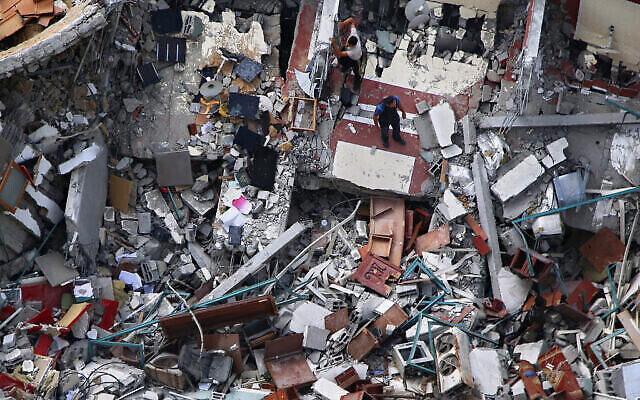
Prime Minister Benjamin Netanyahu vowed Friday that the current round of fighting with Hamas, which appeared to end with an early morning ceasefire, would see a much tougher Israeli stance toward the terror group, and that any future rocket fire from Gaza would be met with “a whole new level of force.” He said Israel had achieved its military objectives in Gaza with “extraordinary” success.
Speaking together with Netanyahu and other security chiefs, Defense Minister Benny Gantz said the truce created an opportunity for peace and it was now time for diplomacy to build a new reality “on the rubble of the homes of the Hamas leaders.” Added Gantz: “If we don’t act diplomatically, quickly and wisely,” this operation will go down as “simply another round of conflict to be followed by the next one.”
In a special statement from the Kirya military headquarters in Tel Aviv, the prime minister said that the “rules of the game were changed” and there would now be no tolerance of any rocket fire from the Gaza Strip.
“We changed the equation not only as regards to the operation but also as regards the future. If Hamas thinks we will tolerate a ‘drizzle’ of rockets, it is mistaken,” the prime minister said, referring to the sporadic fire often seen from Gaza between rounds of more major conflict in recent years.
“We will respond with a whole new level of force to every instance of aggression against the Gaza-envelope communities or anywhere else in Israel,” he said.
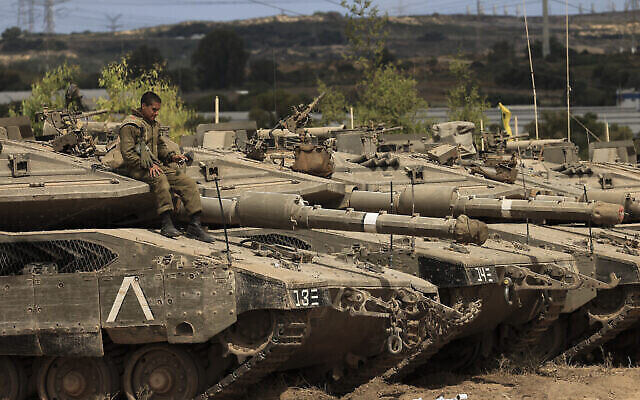
The prime minister also said that the success of the entire operation — including the thwarting of Hamas drones and most rocket attacks, via an improved Iron Dome missile defense system, and countering Hamas attempts to attack from the sea — meant that the terror group would be more careful in the future about attacking Israel.
“Most of Hamas’s capabilities have been harmed — far more seriously than Hamas commanders imagined. Hamas thought it could fire on Jerusalem and the cities of Israel, and we would just react with business as usual,” the prime minister said.
Netanyahu later issued an English-language statement:
The premier said that Israel fulfilled its objective to deal Hamas a “blow it cannot imagine” by destroying the terror tunnel network it built in Gaza; the military turned it into a “death trap.”
Israel destroyed “a considerable proportion” of Hamas’s internal tunnel routes, its “metro,” in which Hamas had invested vast resources, the prime minister said.
“We harmed more than 100 kilometers” of that network, and turned it into “a death trap for the terrorists,” Netanyahu said.
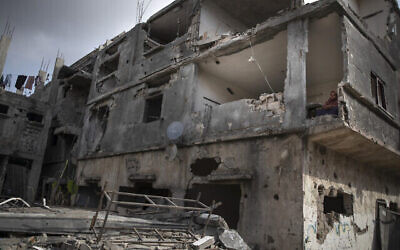
The prime minister said that although the terror group wanted to carry out many cross-border attacks — including at the tail-end of the operation — it was thwarted by Israel’s subterranean barrier, which detected and “destroyed” the terrorists.
Netanyahu added that not everything regarding the outcome and impact of the Israeli strikes is yet known to the public, or even to Hamas: “We did daring and innovative things, without getting dragged into an unnecessary misadventure.”
Aboveground, he said Israel killed over 200 terrorists, including 25 senior officials.
“And those who didn’t die, know today that we can reach them everywhere– above or below ground,” the prime minister said, calling it “an achievement no military has ever achieved.”
Hamas may be bragging as it emerges from the tunnels, he said, “but they realize the destruction they brought upon themselves inside Gaza… they know we set them back years.”
Netanyahu also alluded to the Israel Defense Forces’ controversial demolition of a Gaza tower where numerous media agencies had offices, saying that none of the buildings that were struck were “innocent buildings.”
Instead, he said they were “Hamas offices, Hamas command centers, Hamas weapons stores. We hit rocket factories, weapons labs, weapons stores. And we did this with minimal harm to non-involved civilians.”
The premier said the IDF made “extreme efforts” not to harm civilians, and that no other country in the world takes such steps.
He said that he did not order a ground operation in Gaza because he believed it wasn’t necessary, and that although there will be criticism of that decision, it also prevented unnecessary loss of life.
Netanyahu said he was sad for every civilian killed in the fighting. Israel caused maximum casualties to the Hamas terror group while minimizing Israeli casualties, he said.
Netanyahu also thanked US President Joe Biden and said their six recent conversations were all friendly and warm, arguing that alongside international criticism and pressure, including in the media, Israel also received remarkable international support from dozens of countries and led successful diplomatic efforts with many global leaders.
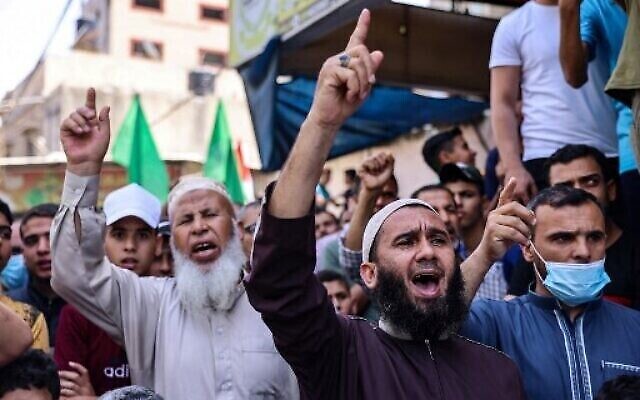
Netanyahu said he had assured Biden that the operation would stop when its goals were achieved, that Biden “understood this,” and that this is precisely what happened.
“Many in the world are capable of distinguishing between Israel, a democratic state that sanctifies life and has the world’s most moral army, and a bloodthirsty terrorist organization that sanctifies death and commits a double war crime: deliberately firing on [our] civilians while using their civilians as human shields,” Netanyahu said.
Referring to apparent criticism that the ceasefire does not provide for the return of Israeli captives held in Gaza, Netanyahu said that Israel has not forgotten civilians Avera Mengistu and Hisham al-Sayed and the bodies of IDF soldiers Hadar Goldin and Oron Shaul, and is committed to returning them home.
He also promised more aid for Ashkelon and other battered southern communities, even more than they received after the 2014 war.
The prime minister said that Ashkelon needs more protection after it was hit by 1,000 rockets in the latest round of violence, and should receive economic advantages as part of moves to help the south of the country to thrive.
There was increasing awareness during the violence that large numbers of people do not have shelters or reinforced areas of their homes and do not have enough time to reach public shelters when they hear a rocket alert siren.
The elderly and people with disabilities were particularly vulnerable, as well as those living in unrecognized Bedouin encampments in the south of the country. Ashkelon Mayor Tomer Glam said last week that some 25% of the residents of his city do not have access to a bomb shelter.
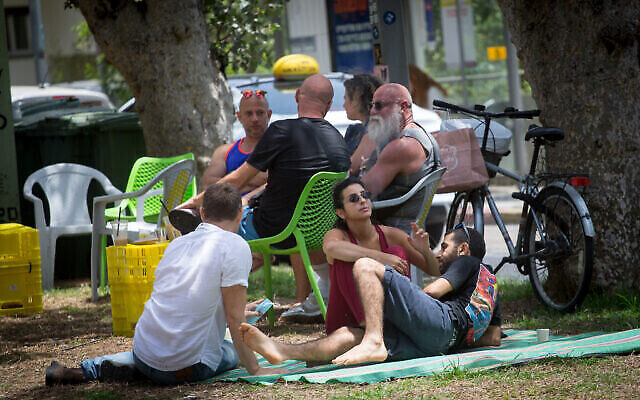
The premier also addressed the eruption of violence between Arabs and Jews inside Israel.
“We arrested 1,300 people and dealt with the rioters with a heavy hand,” he said, repeating his demand that Arab leaders condemn the riots, claiming it was a “significant minority” within that community.
“Nobody will take the law into their own hands — not Arabs and not Jews. Nobody. We are a law-abiding state. And we are one state… We will improve coexistence… so that all Israelis, without exception, will be part of the astonishing success story of our country,” Netanyahu said.
A Chance for Peace
Meanwhile, Gantz said he hoped the ceasefire could herald the start of a new process aimed at achieving long-term peace.
Gantz reiterated that he believed Israel “surprised” the Hamas terror group with the intensity of its response. “The job is done, but not completed,” he said.
“We achieved all our operational goals,” he said, and “set back the enemy by years.” But now that “the military stage is over, it is time for diplomatic action.”
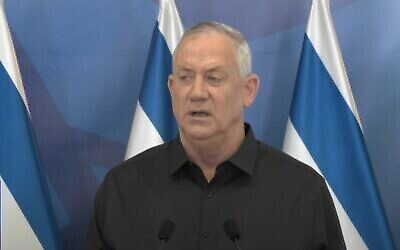
“On the rubble of the homes of the Hamas leaders and of over 100 kilometers of terror tunnels, we must build a new reality,” he said. That “does not mean hasty deals, but long-term processes that will weaken the extremists and strengthen and bring together moderates… There is a chance for peace.”
“We must condition development and reconstruction [in Gaza] not only on calm,” but also on the return of soldiers’ bodies and civilians held hostage in Gaza, and on new moves to create “hope, growth and moderation.”
He called on Netanyahu to not “turn an unprecedented military victory into, heaven forbid, a diplomatic missed opportunity,” saying the matter of the Strip should be strategically and diplomatically dealt with for the long term.
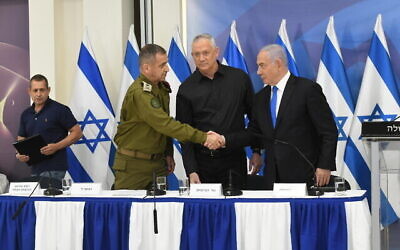
IDF Chief of Staff also addressed the nation, saying that the current operation ended with “very different” results to previous flareups, and that Hamas “made a severe and grave mistake by shooting toward Israel.”
Kohavi, like Netanyahu and Gantz before him, also said the Palestinian terror group was dealt a bigger blow than it anticipated.
“It didn’t read us correctly, and was faced with force it didn’t expect,” he said, adding that the military “made major efforts not to harm civilians” despite Hamas operating in civilian areas.
He said it was no coincidence that Hamas rocket fire tailed off toward the end of the fighting, implying that the blow to Hamas’s rocket launch capacity was extensive.
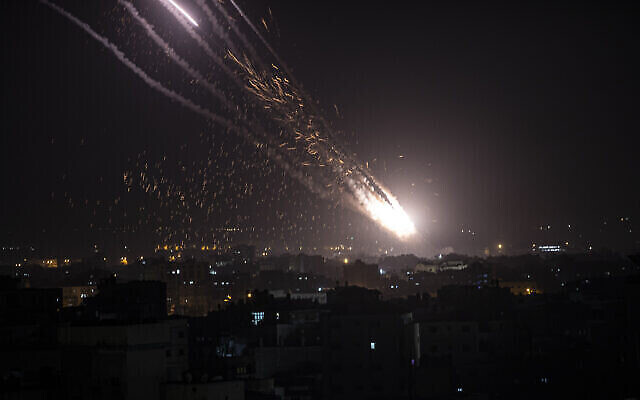
Shin Bet head Nadav Argaman also spoke, saying that the outcome of the operation could change the reality of the conflict, “depending on what will happen from now on.”
“The rules of the game have changed, and what was is not what will be,” Argaman says. “The Hamas of before this conflict is nothing like the Hamas of the day after.”



comments